 Metropolitan Transportation Authority of the State of New York from United States of America, CC BY 2.0
Metropolitan Transportation Authority of the State of New York from United States of America, CC BY 2.0 How Public Transportation’s Efficiency Changed During Covid
The MBTA's efficiency plummeted during Covid; as people chose either personal transportation or personal work, the MBTA lost significant ridership. However, it maintained its vehicle fleet and the depth of its services even as its operating cost per passenger mile increased dramatically.
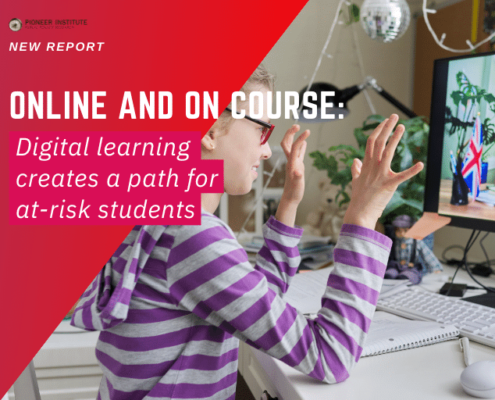
Online and On Course: Digital learning creates a path for at-risk students
Digital learning, the use of computers and the internet to study courses taught in the classroom, is viewed by many educators as a breakthrough to helping those at-risk students stay in school and earn their diplomas. The flexibility afforded by digital learning, with students working on their own time at their own pace, is a way for students to meet the requirements of their courses while handling pressing responsibilities outside of school, problems at home or personal issues. Yet parents should scrutinize digital programs closely. Their quality and effectiveness vary widely. Students are poorly served by point-and-click assessments with no engagement, virtual schools with videos instead of real teachers and programs without pacing and scheduling support.
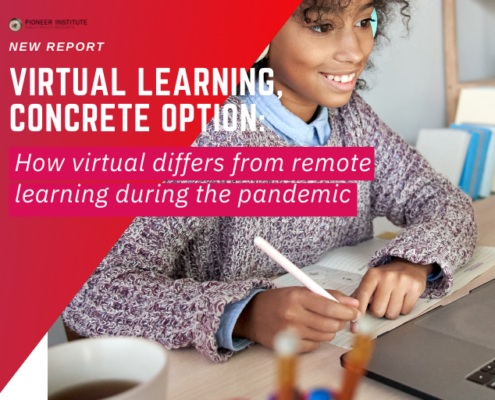
Virtual Learning, Concrete Option: How virtual differs from remote learning during the pandemic
After schools closed in March of 2020 due to the COVID-19 pandemic, students, families and teachers had to shift learning from in-class to online. But the switch to remote learning was hasty and disorganized in many school districts. Families struggled with the technology and coordinating schedules at home, while teachers tried to shift the in-person model to teaching through a computer. The dissatisfaction caused many families to believe that the remote learning they were experiencing was what takes place in full-time virtual schools. In fact the two are much different. This report includes information on how to distinguish between questionable and quality virtual programs.
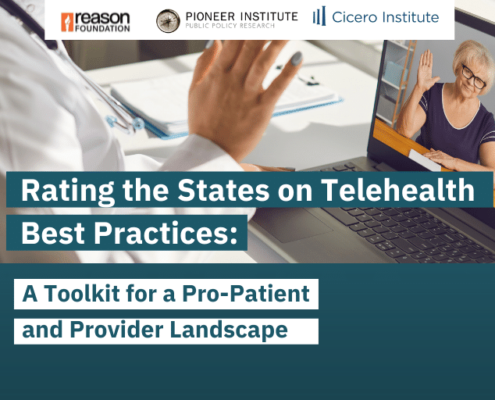
Rating the States on Telehealth Best Practices: A Toolkit for a Pro-Patient and Provider Landscape
The toolkit aims to help policymakers take the next step toward a more quality-oriented, affordable, and innovative health system by ensuring that their state laws on telehealth remove deleterious barriers that have historically discriminated against those in certain geographies, such as those living in rural communities or in underserved urban areas. This report explains policy best practices for ensuring that providers and patients can fully realize the benefits of using telehealth services when appropriate and provides a simple-to-read stoplight rating for each state on how closely their policies align with those best practices.

An “Impending Tsunami” in Mortality from Traditional Diseases?
This report examines whether, after the COVID-19 pandemic subsides, the U.S. will have another looming public health crisis emerging from patients failing to have had their cardiology needs addressed properly during the lockdowns. Moreover, if we surmise that a follow-on public health crisis will emerge, we can also conclude that certain population segments are going to be more impacted by CVD, as there are documented health disparities in this therapeutic area. Finally, there are policy changes that could be taken to mitigate a possible spike in CVD adverse events; the paper will close by recommending certain policy changes.
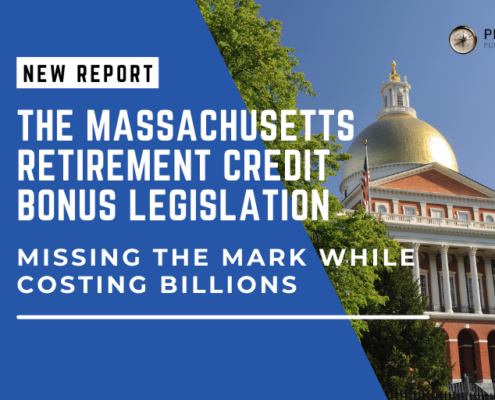
The Massachusetts Retirement Credit Bonus Legislation: Missing the Mark While Costing Billions
Two identical bills to reward public employees with a retirement credit bonus for working during the COVID-19 emergency are currently pending in each chamber of the Massachusetts Legislature. The bills would add billions of dollars in liabilities to public pension funds and reward workers based on their compensation, years of service and age rather than the type or duration of the work performed during the emergency, according to a new study published by Pioneer Institute.

Homeschooling in Uncertain Times: COVID Prompts a Surge
After steadily increasing for years, the number of parents choosing to homeschool their children skyrocketed during the pandemic, and policy makers should do more to acknowledge homeschooling as a viable option, according to a new study published by Pioneer Institute.

Ten Health Policy Changes That Should Outlive COVID-19
A new study published by Pioneer Institute recommends ten healthcare reforms allowed during COVID-19 that should remain in effect permanently, after the state's emergency declaration for COVID-19 ends on June 15. These reforms have enhanced flexibility in the healthcare system, highlighting barriers that make the system more expensive, harder to access and less patient-centered.

A Brighter COVID Dashboard: State Should Cut Confusion And Clarify All Eldercare Cases and Deaths
Over time, the Massachusetts Executive Office of Health and Human…

The Big Lure: Interstate Competition Exacerbates the Economic Fallout from Telecommuting Trends
This report finds that a spate of new incentive and subsidy programs seeking to lure talented workers and innovative businesses away from their home states could constitute an additional challenge to Massachusetts’ economic and fiscal recovery from COVID-19.
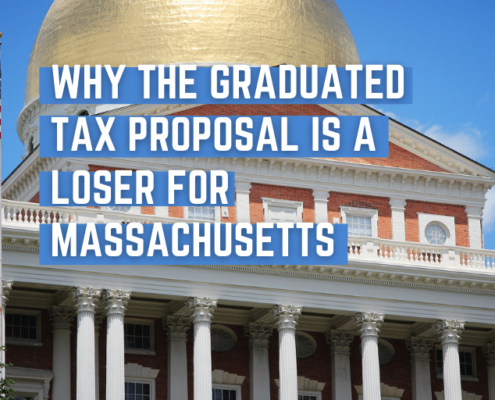
Statement before the MA Joint Committee on Revenue in Opposition to HB 86 (Pages 1-4) A legislative amendment to the Constitution to provide resources for education and transportation through an additional tax on incomes in excess of one million dollars.
Pioneer Institute's Jim Stergios submitted public testimony highlighting Pioneer’s very serious concerns about how the proposed graduated income tax amendment to the Massachusetts State Constitution would have a detrimental impact on the state’s economy as it begins to recover from the COVID-19 pandemic.

The Graduated Income Tax Trap: A Tax on Small Businesses
This policy brief finds that the state constitutional amendment promoted by the Massachusetts Teachers Association and the Service Employees International Union to add a 4 percent surtax to all annual income above $1 million will adversely impact a significant number of pass-through businesses, ultimately slowing the Commonwealth’s economic recovery from COVID-19.

Public Opinion Survey of Massachusetts Residents’ Perceptions of K-12 Education During the Covid-19 Pandemic – March 2021
An Emerson College Poll a poll of 1,500 residents commissioned…

Public vs. Private Employment in Massachusetts: A Tale of Two Pandemics
This report finds that Massachusetts state government employment has been virtually flat during COVID-19 even as employment in the state’s private sector workforce remains nearly 10 percent below pre-pandemic levels, and questions whether it makes sense to shield public agencies from last year’s recession at the expense of taxpayers.

Connecticut’s Dangerous Game: How the Nation’s Wealthiest State Scared Off Businesses and Worsened Its Fiscal Crisis
This report presents evidence that Connecticut’s embrace of an aggressive tax policy to pay for ballooning government expenditures — including a sharp corporate tax rate increase — has been a major driver in the loss of bedrock employers. Higher corporate tax rates, combined with hikes in the personal income tax and, especially, the estate tax, also appear to be a factor driving away a growing number of the state’s wealthiest residents.

A Checklist for How to Revitalize the Industries Hit Hardest by COVID-19
This checklist combines the recommendations of studies published earlier this year offering recommendations for policy makers, organized in three sections: Immediate Relief, Tax Policy Changes and Permanent Reforms. Business owner recommendations are split into COVID-19 Health and Safety Protocols, Expanded Services and Steps to Improve Cash Flow.

The Long View: A Public Policy Roadmap for Saving Small Businesses During the COVID-19 Recovery Period
As the initial economic recovery from the COVID-19 pandemic has slowed, a new study from Pioneer Institute finds that governments must continue to provide short-term relief to stabilize small businesses as they simultaneously consider longer-term reforms to hasten and bolster recovery – all while facing a need to shore up public sector revenues.

Accountability in Massachusetts’ Remote Learning Regulations
0 Comments
/
This policy brief and public comment argues that the COVID-19 pandemic-related revisions to Massachusetts’ remote learning regulations should restore state and local accountability by specifying that any remote academic work shall, to the same extent as in-person education, prepare students to take MCAS tests, and that grading criteria should be the same across in-person, remote, and hybrid learning environments.

Public Policy Guide for Economic Recovery from COVID-19 in the Retail and Hospitality Sectors
This new guide to economic recovery in the retail and hospitality industries published by Pioneer Institute calls for the federal and state governments to consider consumption-based refundable tax credits for brick and mortar businesses; the federal government to conduct a detailed study of the costs and benefits of suspending employer-side payroll taxes; businesses to pay special attention to developing and marketing their cleanliness, hygiene and contactless procedures; and third-party customer review sites to include comments about the implementation of COVID safety measures to provide options and reassurance to safety-minded consumers.

How Should Massachusetts Reopen Its K–12 Schools in the Fall? Lessons from Abroad and Other States
This report asserts that, with the fall semester fast approaching, Massachusetts should provide more specific COVID-19-related guidance for school districts about ramping up remote learning infrastructure; rotating in-person cohort schedules; diversifying methods of communication between students, parents, and teachers; and investigating physical distancing capabilities. Districts must determine whether to adopt in-person, remote, or hybrid schooling options, and they will not be ready for the fall unless the state provides clear direction.

Open Letter: COVID-19 Study and Recommendations Task Force established pursuant to Massachusetts Bill H.4672
Recently, Governor Baker signed legislation, H. 4672, that would create a Covid-19 task force, appointed by the legislature, to study and make recommendations to the general court that address health disparities among certain populations based on certain characteristics, including age, and which also asks the future task force to recommend other impacted populations for further study. Pioneer has prepared a public letter to that future task force that contains a list of specific recommendations regarding Covid-19 and the state’s nursing homes.

Class Dismissed: Massachusetts’ Lack of Preparedness for K–12 Digital Learning During COVID-19
This white paper contends that the shutdown of Massachusetts schools due to the COVID-19 virus and the shift to online education have exposed the uneven nature of digital learning in the Commonwealth, and calls for state officials to develop programs to create more consistency. The study urges state officials to create a plan for the 2020-21 school year that will address the education gaps that occurred during the final semester of this school year. It also encourages a plan to address how future extended closures would be managed.

As the COVID-19 Pandemic Spurs Consumer Shift to E-Commerce, the Massachusetts Sales Tax Collection System Deserves Renewed Scrutiny
At a time when state tax revenues are plummeting, a plan to modernize sales tax collection could get money into state coffers more quickly. This report analyzes the merits of a two-part proposal Governor Baker included in his January state budget submission to streamline state sales tax collections. Sullivan and Mikula find that the first part of Baker’s plan makes sense and is entirely feasible because advances in electronic data processing and electronic funds transfer have eliminated the need for protracted remittance timetables.

Shifting Special Needs Students to Online Learning in the COVID-19 Spring
This report by Pioneer Institute and ASU Prep Digital addresses the problem that school closures due to COVID-19 have separated more than seven million K-12 special needs students from support they receive in the classroom, and shows how online learning can be appropriate for most of those students if teachers and parents work as a team to provide each one with what he or she needs.

Going Up: The Challenge of Reopening Shared Office Buildings in a COVID-19 World
This report finds that safely bringing employees back into workplaces presents a significant challenge for employers located in office buildings, particularly when it comes to elevator operations and building entry and exit. To address the challenge, managers must develop plans to control the flow of workers.

Breaking the Code: The State of Computer Science Education in America’s Public Schools
Even as the COVID-19 pandemic has further transitioned education…

Telecommuting Survey Reveals Potential for Greater Shift Towards Remote Work After COVID-19 Pandemic
Citing an avoidance of the commute and more flexible scheduling, nearly 63 percent of respondents to Pioneer Institute’s survey, “Will You Commute To Work When The COVID-19 Crisis Is Over?” expressed a preference to work from home one day a week, and a plurality preferred two to three days a week, even after a COVID-19 vaccine is available.

The Negative Impact of COVID-19 Upon the Biopharmaceutical Sector
Contrary to conventional wisdom that says the coronavirus pandemic will generally benefit biopharmaceutical companies, a new Pioneer Institute study finds many companies will emerge from the pandemic commercially weaker, dealing with delays in new product launches and with fewer resources to invest in research and development.

Understaffing at Long-Term Care Facilities Is Not Unique to the Holyoke Soldiers’ Home. It’s Embedded in Federal Standards.
This study shows that standards enforced at the federal and state levels are insufficient to address chronic staffing issues reported by staff and residents’ families at the Holyoke Soldiers’ Home, making that facility particularly vulnerable to the COVID-19 pandemic.

COVID-19 will likely lead to a recession. Can Massachusetts municipal budgets handle one?
Using municipalities' experiences during the Great Recession, a new policy brief examines the likely impact of COVID-19 on local property taxes, as well as political implications for state aid. We list the municipal revenues by category among the least tax-reliant communities in MA, show the trajectory of tax revenue growth rate in Massachusetts state and local governments, and rank stabilization fund assets per capita among Massachusetts Gateway Cities.
